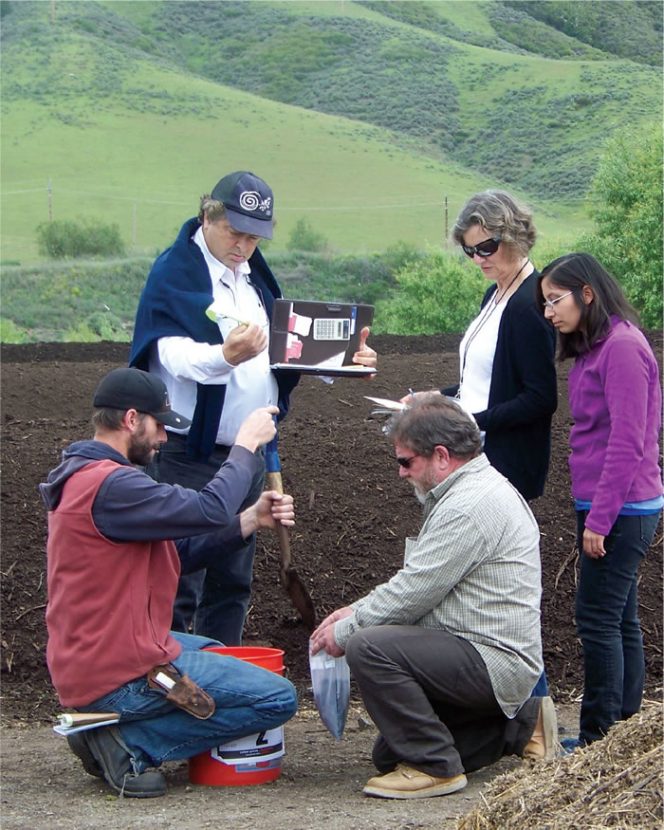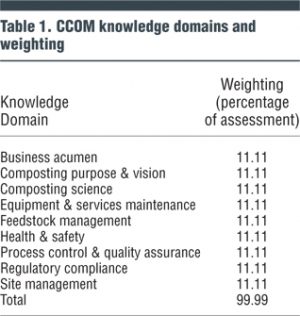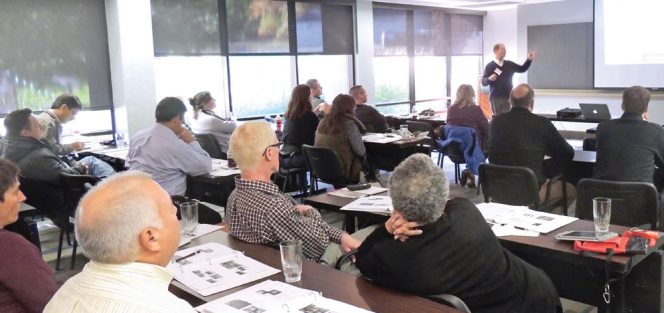In October, the Certification Commission of the US Composting Council launched the first professional certification in the U.S. for compost operations managers.
Cary Oshins
BioCycle December 2016

One of the certification prerequisites is having attended a compost operations course of at least three days’ duration.
The decision to build a professional credential “from the ground up” came after considerable research and deliberation on the part of both the USCC and the Composting Council Research and Education Foundation (CCREF). That research ultimately identified six top reasons why compost operations managers would choose to become USCC Certified: Required for promotions or salary increases; Essential for career development; Ensures public safety; Required or preferred by the employer; Shows professionalism and improves the public’s view of compost operation managers as professionals; and May be required for regulatory compliance.
Creation of the first professional credential by and for the compost manufacturing industry started in February 2015 with a $150,000 development grant from the 11th Hour Project to the CCREF. “A lot of work goes on behind the scenes to bring a professional certification program into the world,” explains Franciosi. “One highly visible stage before the full launch was the beta testing done in July and August 2016. Our goal was to have 200 individuals register for and take the CCOM beta test, and more than 300 stepped into the registration process before the deadline. Not everyone made it to one of the beta test events set up at USCC member facilities and offices around the country, but we are in communication with all of them. Everyone who becomes certified in these opening months will get the chance to stand in the spotlight as our first group, in the first year, in Los Angeles.”
A Certification Commission with an official charter was established to work in close collaboration with the USCC. Founding Commissioners were Jack Hoeck (Rexius Forest By-Products), Jerry Bartlett (Bartlett Ventures), Tom Del Conte (Vision Recycling), Mark Rose (The LETCO Group), Scott Subler (ClimeCo Corp.) and Chuck Wilson (A1 Organics). The Certification Commission’s mission is to develop and administer national, valid, credible, vendor-neutral certification programs for organics recycling professionals, which enhance the profession of organics recycling facility management and in turn benefit the community, business and environmental outcomes. The founding commissioners were selected for both their dedication to the compost manufacturing industry and their track record as successful business people.
Certification Development
The development process started with identifying and defining which category of composting facility employee would be certified first. Through focus groups, key stakeholder interviews and background research, it was decided to start with the individual with day-to-day responsibility for the operation — the person who facility owners, regulators and the general public depend on to assure a well-run and successful composting operation. Once that person and the general job duties were defined, a large-scale survey was employed to validate and identify the balance among the knowledge “domains” (areas) that the CCOM job entails. Interestingly, survey respondents felt that all the domains were equally important and equally difficult (Table 1).
The Commissioners established the basic components of what is required to be certified — to meet the prerequisites and then pass a test. The four prerequisites are: High school diploma or equivalent; Minimum age of 21; Has attended a compost operations course of at least three days’ duration; Two years of full-time experience in the organics recycling industry, with at least one of those years in actual operations (not necessarily at a composting facility, e.g., could be working in a municipal organics collection program or as a consultant). Once these prerequisites are demonstrated through an online application, the candidate can then schedule and pay for the computer based test ($349 for USCC members; $449 for nonmembers), which can be taken at any of over 600 testing centers operated by the USCC’s test delivery partner, the Performance Assessment Network.
Development of the test itself was the largest and most expensive part of the whole process (about 60% of the $250,000 that has been invested to date to launch the certification). It started with recruiting many “subject matter experts” from across the industry, geographically and technologically, and included operators, regulators and facility owners. These experts were coached on test item construction, then critiqued and edited each other, resulting in a pool of over 300 questions across the nine domains, of which around 180 were selected to “beta-test.” The process continued with setting up beta test centers around the country, recruiting beta test takers, beta testing the 180 individual test items in two different test forms, analyzing the results, and finalizing the 75 questions that are on the final form of the test.
The test itself is not a comprehensive exam of compost operations knowledge, but rather a sampling of knowledge that should distinguish someone who is qualified to be a CCOM from someone who isn’t, given that they already meet the prerequisites. The questions on the test are drawn from all nine domains outlined in Table 1. The Commission recognized that no one individual has had experience with every feedstock, technology and scale of operation, therefore the passing grade is set at 70 percent. Sample tests that give a candidate a feel for the types of questions on the exam can be downloaded for a small fee. The Commission is also in the process of developing review guides.
The process of building the USCC’s certification infrastructure and its first program — the CCOM — has been guided by The Communicators, a company that helps industry organizations build certifications. “We were impressed from the start by the background research and understanding that the USCC showed us at the start, plus its commitment to meet international standards on certification programs,” notes Georgia Patrick, The Communicators’ CEO and lead consultant to the USCC. “For example, the CCOM test is tied to a set of standards that are publicly available, and not to any one specific course. Those standards are in Appendix A in the CCOM Handbook.” She adds that an exam given at the end of a course typically is designed to reflect the knowledge gained in the course, whereas a test developed for a professional certification is designed to demonstrate the candidate meets minimum qualifications for the position, as they already have the required experience and training.
Additional Certification Categories
Looking ahead, the Certification Commission is considering other categories of professionals to certify, such as advanced level managers, entry-level workers, facility owners, composting industry consultants and educators. “This is the beginning of what we expect will be decades of credentialing excellence,” emphasizes Lorrie Loder, President of the USCC and the first composting professional to be certified. Adds Franciosi: “There are many things our Certification Commission can eventually achieve and take on, but we have to succeed with each program and hold to high standards of performance, accountability and credibility at every step.”
Future thinking also includes innovation and collaboration when it comes to working with regulators and what they would like to have included in a national certification with some kind of state-specific add-on tests for certification in a specific state, e.g., to cover the knowledge, skills and competencies that apply in their state, but may not be required by other states. “We will be approaching states that require training or even certification and have them recognize the CCOM as the way to validate that requirement,” says Franciosi. “That will likely require adding state-specific questions to the CCOM test.” States currently requiring certification include Maryland, Colorado and Texas, but they have not recognized CCOM at this point.
Eventually, the Certification Commission might offer verification or accreditation of facilities. “Whether you call it certification or accreditation, the verification of a facility to certain standards and evaluation processes is something already going on at hospitals, colleges, and power plants,” he adds. “Could our Certification Commission eventually take on the work of evaluating composting facilities? All of that and more is possible because of the business model we put together for a credentialing enterprise. However, certification of the professional comes first. After all, what is any facility evaluation without looking at the capabilities, competencies and continuing education of the people who build, own, operate and maintain a facility?”
CCOM Certification is open to all, without any restrictions or requirements for USCC membership (although price breaks and group discounts for fees are extended to USCC members). To learn more, visit www.certificationsUSCC.org. Key areas to begin with include the Candidate Handbook, Frequently Asked Questions (FAQ), and “Stay Connected.”
Cary Oshins is Director of Certification at the US Composting Council.












